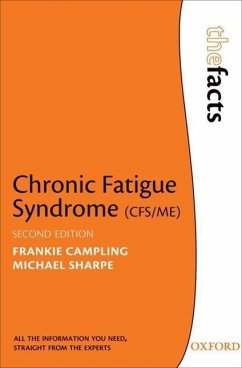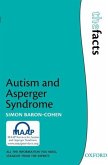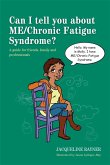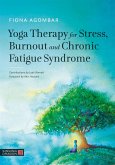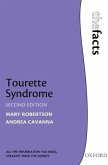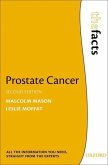Frankie Campling (A person with CFS / ME), Michael Sharpe (Professor of psychological medicine and symptom res
Chronic Fatigue Syndrome
24,99 €
inkl. MwSt.
Versandfertig in 2-4 Wochen

12 °P sammeln
Frankie Campling (A person with CFS / ME), Michael Sharpe (Professor of psychological medicine and symptom res
Chronic Fatigue Syndrome
- Broschiertes Buch
- Merkliste
- Auf die Merkliste
- Bewerten Bewerten
- Teilen
- Produkt teilen
- Produkterinnerung
- Produkterinnerung
This book presents a compassionate guide to this illness, providing sufferers and their families, with practical advice, based solely on scientific evidence. It is unique in being written by both a sufferer and a physician. Included in the book is a detailed guide to self-help, written from a patient's perspective, but evidence-based.
Andere Kunden interessierten sich auch für
![Diagnosis and Treatment of Chronic Fatigue Syndrome and Myalgic Encephalitis 2nd Edition Diagnosis and Treatment of Chronic Fatigue Syndrome and Myalgic Encephalitis 2nd Edition]() Diagnosis and Treatment of Chronic Fatigue Syndrome and Myalgic Encephalitis 2nd Edition21,99 €
Diagnosis and Treatment of Chronic Fatigue Syndrome and Myalgic Encephalitis 2nd Edition21,99 €![Autism and Asperger Syndrome Autism and Asperger Syndrome]() Simon Baron-Cohen (Dire Professor of Developmental PsychopathologyAutism and Asperger Syndrome22,99 €
Simon Baron-Cohen (Dire Professor of Developmental PsychopathologyAutism and Asperger Syndrome22,99 €![Can I tell you about ME/Chronic Fatigue Syndrome? Can I tell you about ME/Chronic Fatigue Syndrome?]() Jacqueline RaynerCan I tell you about ME/Chronic Fatigue Syndrome?14,99 €
Jacqueline RaynerCan I tell you about ME/Chronic Fatigue Syndrome?14,99 €![Yoga Therapy for Stress, Burnout and Chronic Fatigue Syndrome Yoga Therapy for Stress, Burnout and Chronic Fatigue Syndrome]() Fiona AgombarYoga Therapy for Stress, Burnout and Chronic Fatigue Syndrome42,99 €
Fiona AgombarYoga Therapy for Stress, Burnout and Chronic Fatigue Syndrome42,99 €![Tourette Syndrome Tourette Syndrome]() Mary Robertson (University C Emeritus Professor in NeuropsychiatryTourette Syndrome23,99 €
Mary Robertson (University C Emeritus Professor in NeuropsychiatryTourette Syndrome23,99 €![Diagnostic Controversy Diagnostic Controversy]() Diagnostic Controversy53,99 €
Diagnostic Controversy53,99 €![Prostate Cancer Prostate Cancer]() Malcolm Mason (Cancer Research Wales Professor of Clinical OncologyProstate Cancer23,99 €
Malcolm Mason (Cancer Research Wales Professor of Clinical OncologyProstate Cancer23,99 €-
-
-
This book presents a compassionate guide to this illness, providing sufferers and their families, with practical advice, based solely on scientific evidence. It is unique in being written by both a sufferer and a physician. Included in the book is a detailed guide to self-help, written from a patient's perspective, but evidence-based.
Hinweis: Dieser Artikel kann nur an eine deutsche Lieferadresse ausgeliefert werden.
Hinweis: Dieser Artikel kann nur an eine deutsche Lieferadresse ausgeliefert werden.
Produktdetails
- Produktdetails
- The Facts
- Verlag: Oxford University Press
- 2 Revised edition
- Seitenzahl: 216
- Erscheinungstermin: 3. Juli 2008
- Englisch
- Abmessung: 198mm x 131mm x 14mm
- Gewicht: 236g
- ISBN-13: 9780199233168
- ISBN-10: 0199233160
- Artikelnr.: 23549862
- Herstellerkennzeichnung
- Libri GmbH
- Europaallee 1
- 36244 Bad Hersfeld
- gpsr@libri.de
- The Facts
- Verlag: Oxford University Press
- 2 Revised edition
- Seitenzahl: 216
- Erscheinungstermin: 3. Juli 2008
- Englisch
- Abmessung: 198mm x 131mm x 14mm
- Gewicht: 236g
- ISBN-13: 9780199233168
- ISBN-10: 0199233160
- Artikelnr.: 23549862
- Herstellerkennzeichnung
- Libri GmbH
- Europaallee 1
- 36244 Bad Hersfeld
- gpsr@libri.de
Frankie Campling suffers from CFS/ME and provides telephone support for others like herself. Professor Michael Sharpe is a Professor in Psychological Medicine at The University of Edinburgh. He runs specialist clinic services for CFS/ME and has published widely on the illness.
* Section 1 - Chronic Fatigue Syndrome: its nature, diagnosis, and
treatment
* 1: Our aims in this section
* 2: What should it be called and why?
* 3: What is chronic fatigue syndrome (CFS/ME)?
* 4: How is a diagnosis of CFS/ME made?
* 5: What other conditions is CFS/ME linked to?
* 6: What do we know about CFS/ME?
* 7: Making sense of what we know about the causes of CFS/ME
* 8: What is the best treatment?
* 9: Some myths about CFS/ME
* 10: Summary
* Section 2 - The idea of helping yourself
* 11: Introduction to self-help
* 12: Balancing rest and activity
* 13: Relaxation and calm breathing
* 14: Appropriate exercise
* 15: Improving your sleep
* 16: Getting the best from your food
* 17: Coping with pain
* 18: Difficulties with memory and concentration
* 19: A gradual increase in activity
* 20: What gets in the way of being sensible?
* 21: Improving your mood
* 22: Managing anxiety, panic and depression
* 23: Managing your thinking
* 24: Dealing with problems
* 25: Better communication
* 26: Managing relationships and people
* 27: Getting the best from today
* 28: Managing employment
* 29: Thinking about the future
* 30: Summary of our self-help advice
* Section 3 - Special Issues
* 31: Thinking about therapies and therapists, both medical and
complementary/alternative
* 32: Cognitive behaviour therapy, graded excercise therapy, and
adaptive pacing therapy
* 33: Children and young people with CFS/ME
* Appendices
* 1: Medical glossary
* 2: Keeping a diary
* 3: Further information
treatment
* 1: Our aims in this section
* 2: What should it be called and why?
* 3: What is chronic fatigue syndrome (CFS/ME)?
* 4: How is a diagnosis of CFS/ME made?
* 5: What other conditions is CFS/ME linked to?
* 6: What do we know about CFS/ME?
* 7: Making sense of what we know about the causes of CFS/ME
* 8: What is the best treatment?
* 9: Some myths about CFS/ME
* 10: Summary
* Section 2 - The idea of helping yourself
* 11: Introduction to self-help
* 12: Balancing rest and activity
* 13: Relaxation and calm breathing
* 14: Appropriate exercise
* 15: Improving your sleep
* 16: Getting the best from your food
* 17: Coping with pain
* 18: Difficulties with memory and concentration
* 19: A gradual increase in activity
* 20: What gets in the way of being sensible?
* 21: Improving your mood
* 22: Managing anxiety, panic and depression
* 23: Managing your thinking
* 24: Dealing with problems
* 25: Better communication
* 26: Managing relationships and people
* 27: Getting the best from today
* 28: Managing employment
* 29: Thinking about the future
* 30: Summary of our self-help advice
* Section 3 - Special Issues
* 31: Thinking about therapies and therapists, both medical and
complementary/alternative
* 32: Cognitive behaviour therapy, graded excercise therapy, and
adaptive pacing therapy
* 33: Children and young people with CFS/ME
* Appendices
* 1: Medical glossary
* 2: Keeping a diary
* 3: Further information
* Section 1 - Chronic Fatigue Syndrome: its nature, diagnosis, and
treatment
* 1: Our aims in this section
* 2: What should it be called and why?
* 3: What is chronic fatigue syndrome (CFS/ME)?
* 4: How is a diagnosis of CFS/ME made?
* 5: What other conditions is CFS/ME linked to?
* 6: What do we know about CFS/ME?
* 7: Making sense of what we know about the causes of CFS/ME
* 8: What is the best treatment?
* 9: Some myths about CFS/ME
* 10: Summary
* Section 2 - The idea of helping yourself
* 11: Introduction to self-help
* 12: Balancing rest and activity
* 13: Relaxation and calm breathing
* 14: Appropriate exercise
* 15: Improving your sleep
* 16: Getting the best from your food
* 17: Coping with pain
* 18: Difficulties with memory and concentration
* 19: A gradual increase in activity
* 20: What gets in the way of being sensible?
* 21: Improving your mood
* 22: Managing anxiety, panic and depression
* 23: Managing your thinking
* 24: Dealing with problems
* 25: Better communication
* 26: Managing relationships and people
* 27: Getting the best from today
* 28: Managing employment
* 29: Thinking about the future
* 30: Summary of our self-help advice
* Section 3 - Special Issues
* 31: Thinking about therapies and therapists, both medical and
complementary/alternative
* 32: Cognitive behaviour therapy, graded excercise therapy, and
adaptive pacing therapy
* 33: Children and young people with CFS/ME
* Appendices
* 1: Medical glossary
* 2: Keeping a diary
* 3: Further information
treatment
* 1: Our aims in this section
* 2: What should it be called and why?
* 3: What is chronic fatigue syndrome (CFS/ME)?
* 4: How is a diagnosis of CFS/ME made?
* 5: What other conditions is CFS/ME linked to?
* 6: What do we know about CFS/ME?
* 7: Making sense of what we know about the causes of CFS/ME
* 8: What is the best treatment?
* 9: Some myths about CFS/ME
* 10: Summary
* Section 2 - The idea of helping yourself
* 11: Introduction to self-help
* 12: Balancing rest and activity
* 13: Relaxation and calm breathing
* 14: Appropriate exercise
* 15: Improving your sleep
* 16: Getting the best from your food
* 17: Coping with pain
* 18: Difficulties with memory and concentration
* 19: A gradual increase in activity
* 20: What gets in the way of being sensible?
* 21: Improving your mood
* 22: Managing anxiety, panic and depression
* 23: Managing your thinking
* 24: Dealing with problems
* 25: Better communication
* 26: Managing relationships and people
* 27: Getting the best from today
* 28: Managing employment
* 29: Thinking about the future
* 30: Summary of our self-help advice
* Section 3 - Special Issues
* 31: Thinking about therapies and therapists, both medical and
complementary/alternative
* 32: Cognitive behaviour therapy, graded excercise therapy, and
adaptive pacing therapy
* 33: Children and young people with CFS/ME
* Appendices
* 1: Medical glossary
* 2: Keeping a diary
* 3: Further information
